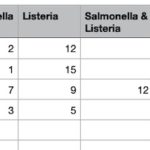On Friday, January 22, 2021, the USDA withdrew a controversial poultry line speed rules from the previous administration that would have rolled back line-speed standards at poultry plants. The first such proposal was made by the Obama administration in 2012. At the time, and over the last nine years, food safety experts and consumer advocates have opposed increasing these speeds, which whip poultry carcasses past inspectors at three birds per second. Executive Director of Food and Water Watch's Wenoah Hauter, said in a statement, "Such speeds would have made it nearly impossible for inspectors to properly due their jobs and ensure food safety and public health." She continued, "We’re pleased that the Biden administration has resisted the bidding of the immensely powerful … [Read more...]
2020 Meat and Poultry Recalls Hit All-Time Low
In-Depth Analysis From Food Poisoning Bulletin Who’s Been Minding our Meat? When Food Poisoning Bulletin began a review of food recalls in 2020, we discovered there had been a dramatic decline in the number of recalls for meat and poultry but not for other food products. To find out why, we analyzed five years of recall data published by the U.S. Department of Agriculture's Food Safety and Inspection Service (USDA FSIS), the federal agency that regulates meat, poultry, and egg products. Our research showed that meat and poultry recalls plummeted to an all-time low this year. Just 29 recalls were issued for meat and poultry in 2020 (through December 10) and only one of them was for bacterial contamination. Those numbers are a fraction of the annual averages since 2016 - 128 total … [Read more...]
FSIS Foodborne Illness Outbreaks For Fiscal Year 2019
The USDA's Food Safety and Inspection Service (FSIS) has released its summary of FSIS foodborne illness outbreaks for fiscal year 2019 that involved FSIS-regulated products. The four pathogens that most often affect those products are Salmonella, Shiga toxin-producing E. coli (STEC), Listeria monocytogenes, and Campylobacter. During fiscal year 2019, FSIS investigated 16 outbreaks that sickened about 1000 people and hospitalized more than 175 patients. 94% of these outbreaks involved illnesses in more than one state. Salmonella was the most common pathogen in these outbreaks, followed by STEC, and Listeria monocytogenes. Beef and chicken were the most common food products of interest. Salmonella serotypes in these outbreaks included Blockley, Enteritidis, Newport, Rissen, and … [Read more...]
Keep Thanksgiving Leftovers Safe With Tips From the USDA
Happy Thanksgiving! Keep Thanksgiving leftovers safe with tips from the USDA. Since the meal for this holiday is usually quite large, you will most likely have lots of leftovers, which must be stored properly to prevent food poisoning. The temperature danger zone for perishable foods is 40°F to 140°F. In that range, bacteria in foods can double every 20 minutes. First, remember the two hour rule. All perishable foods must be refrigerated within two hours of coming out of the oven or out of the fridge for serving. This time decreases to one hour if the ambient air temperature is above 90°F. To make sure that food cools down quickly and gets through the danger zone fast, divide food into smaller amounts and package in shallow containers. When you have stored the food in the … [Read more...]
Food Thermometer Study Proves Education Improves Kitchen Food Safety
A food thermometer study conducted by the USDA's FSIS and published in the Journal of Food Protection in July 2020 proves that education improves kitchen food safety techniques. The purpose of the study was to test effectiveness of intervention for consumer thermometer use. Using a food thermometer is the only way to make sure that ground meats are safe to eat before serving. Ground beef, pork, and lamb should be cooked to 160°F and ground chicken and turkey should be cooked to 165°F. USDA's Under Secretary for Food Safety, Dr. Mindy Brashears, said in a statement, "As a food scientist, it’s important that we publish these results in peer-reviewed journals and that other scientists have access to the methodology and results. This is in direct alignment with my goal to lead food … [Read more...]
Fourth of July Food Safety Tips From the USDA to Avoid Illness
These Fourth of July food safety tips from the USDA will help you avoid foodborne illness this holiday weekend. Because more people are staying at home and cooking at home, these tips are important. Dr. Mindy Brashears, the USDA's Under Secretary for Food Safety said in a statement, "Foodborne illness can increase during summer because of the warmer temperatures and extended time spent outside. You may not be grilling at the park this year, but instead you may be grilling at home. As we celebrate this Fourth of July holiday, I encourage consumers to use food safety steps to reduce their risk of illness." First, avoid cross-contamination between raw meats and poultry and foods that are eaten uncooked. Wash and sanitize all surfaces and utensils after they touch raw meats and … [Read more...]
First Quarter Recalls Plummet, But Experts Expect Rebound
The first quarter recalls from the FDA and USDA plummeted to unprecedented low levels during the coronavirus pandemic lockdown. For instance, while the FDA's recall level did dip in the first quarter, down 9.6% from 2019, the USDA only posted three recalls in January, February, and March 2020. That's a decrease of 78.6% from the previous year. And in the second quarter, only five recalls were posted on the USDA web site, with just 18 days left in the quarter. Stericycle Expert Solutions, which analyzes recalls every quarter, predict that "the coronavirus pandemic will lead to an eventual spike of recalls across the food, drug, consumer product, medical device, and auto industries once restrictions on businesses are lifted and regulators resume their traditional oversight … [Read more...]
USDA Will Expand non-O157 STEC Testing to Ground Beef
According to an announcement in the Federal Register, the USDA will expand non-O157 STEC (Shiga toxin-producing E. coli) testing to ground beef, bench trim, and other raw ground beef components. The non-O157 strains include what's called the "Big Six" E. coli strains: E. coli O26, O45, O103, O111, O121, and O145. USDA first announced the decision to test raw, non-intact beef product and raw, intact beef product for those six strains on September 20, 2011. The decision was made because these strains have high pathogenicity, low infectious dose, transmissibility from person to person, and thermal resistance of the pathogens that is high enough to survive ordinary cooking. The estimated benefits of this new testing include reduced outbreak-related recalls, reduced illnesses and … [Read more...]
Memorial Day Food Safety Tips From The USDA To Stay Safe and Healthy
The USDA is offering Memorial Day food safety tips to help keep you. safe and healthy. This holiday weekend is not like other years because of the coronavirus pandemic, but don't forget about food safety while you observe the holiday. Remember that if the weather is hot and humid, perishable foods can only be out of refrigeration for one hour before bacteria start to grow rapidly. Those foods include meat and poultry, dips and cold salads, and cut fruits and vegetables. About 85% of respondents to a recent USDA survey said they don't nest cold foods in ice when served. Keeping cold foods cold is important for food safety. In that same survey, 66% of respondents said they did. not keep cooked foods, such as burgers and hot dogs, warm after cooking. Those foods need to be kept … [Read more...]












